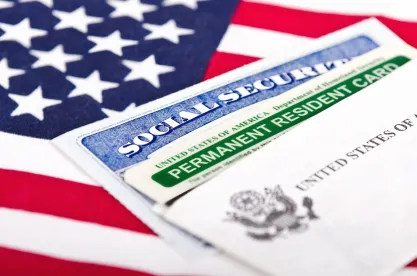Assuming there is no further stalling or litigation by the government, Employment Authorization Documents (EADs) may finally be on their way to approximately 75,000 foreign nationals who have been waiting for them, in some cases for months, after having approved application notices in hand.
In Subramanya v. USCIS, federal District Judge Algenon L. Marbley issued a temporary order giving USCIS seven days to produce the backlogged cards. Judge Marbley agreed to continue the hearing on the preliminary injunction until August 24, 2020 to allow the parties time to negotiate a consent degree to resolve the claims. Form I-9 rules do not allow many categories of “alien authorized to work” employees to use the petition approval notices to prove authorization to work—the actual EAD is often needed under the rules.
Since deciding to cancel the printing contract with an outside vendor and bring the production of Green Cards and EADs in-house, USCIS has been unable or unwilling to address the demand or eliminate the backlog. The agency’s plan to hire more workers for this task appears to have been put on hold because of financial mismanagement, or political maneuvering, despite being a fee-based service that has had no financial issues until this year.
Plaintiffs in Subramanya argued USCIS abused its power in an egregious and outrageous manner either with the intention of harming the plaintiffs or out of deliberate indifference to the harms caused. Plaintiffs waiting for EADs have lost wages, lost healthcare, lost jobs, lost the ability to support their families and have even been forced into homeless shelters. Employers have been forced to terminate valuable employees, losing their expertise and talents. Judge Marbley wrote that although there is no statutory time frame for producing EADs, that “does not mean the agency retains unfettered discretion to issue EADs at any time they wish.”
Since the failure to produce the EADs is a self-inflicted wound, USCIS needs to take responsibility and solve the problem. The solution may come in the form of a consent decree. If the agency cannot produce the cards, perhaps it should consider a temporary adjustment to Form I-9 List A documents and allow foreign nationals to work on the basis of their EAD approvals alone. This would help employees and employers who are already dealing with the COVID-19 crisis. Although those waiting for Green Cards are not part of this litigation, they have been similarly hindered by the lack of card production and also need some form of relief.
It is interesting to note that the named plaintiff in the case has received her EAD but Judge Marbley dismissed the agency’s argument that this made the case moot. Among other things, he noted that the agency cannot just pick off one plaintiff and expect that to mean that the proposed class cannot move forward.




 />i
/>i

